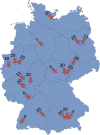Clinical Frailty Scale (CFS) reliably stratifies octogenarians in German ICUs: a multicentre prospective cohort study
- PMID: 30005622
- PMCID: PMC6044022
- DOI: 10.1186/s12877-018-0847-7
Clinical Frailty Scale (CFS) reliably stratifies octogenarians in German ICUs: a multicentre prospective cohort study
Abstract
Background: In intensive care units (ICU) octogenarians become a routine patients group with aggravated therapeutic and diagnostic decision-making. Due to increased mortality and a reduced quality of life in this high-risk population, medical decision-making a fortiori requires an optimum of risk stratification. Recently, the VIP-1 trial prospectively observed that the clinical frailty scale (CFS) performed well in ICU patients in overall-survival and short-term outcome prediction. However, it is known that healthcare systems differ in the 21 countries contributing to the VIP-1 trial. Hence, our main focus was to investigate whether the CFS is usable for risk stratification in octogenarians admitted to diversified and high tech German ICUs.
Methods: This multicentre prospective cohort study analyses very old patients admitted to 20 German ICUs as a sub-analysis of the VIP-1 trial. Three hundred and eight patients of 80 years of age or older admitted consecutively to participating ICUs. CFS, cause of admission, APACHE II, SAPS II and SOFA scores, use of ICU resources and ICU- and 30-day mortality were recorded. Multivariate logistic regression analysis was used to identify factors associated with 30-day mortality.
Results: Patients had a median age of 84 [IQR 82-87] years and a mean CFS of 4.75 (± 1.6 standard-deviation) points. More than half of the patients (53.6%) were classified as frail (CFS ≥ 5). ICU-mortality was 17.3% and 30-day mortality was 31.2%. The cause of admission (planned vs. unplanned), (OR 5.74) and the CFS (OR 1.44 per point increase) were independent predictors of 30-day survival.
Conclusions: The CFS is an easy determinable valuable tool for prediction of 30-day ICU survival in octogenarians, thus, it may facilitate decision-making for intensive care givers in Germany.
Trial registration: The VIP-1 study was retrospectively registered on ClinicalTrials.gov (ID: NCT03134807 ) on May 1, 2017.
Keywords: Clinical frailty scale; Frailty; Intensive care outcome; VIP1.
Conflict of interest statement
Ethics approval and consent to participate
Ethical approval was obtained from each study side with Duesseldorf (Ethic Committee of Medical Faculty of Heinrich-Heine University Duesseldorf, Germany; Head: Prof. Dr. T. Hohlfeld; study-number: 5644R and registration-ID: 2016075289 approved on 16th September 2016) being the national headquarter for all german ethic committees (Additional file 1: ethics committees). Written informed consent was obtained from all patients.
Consent for publication
Not applicable.
Competing interests
The authors declare that they have no competing interests.
Publisher’s Note
Springer Nature remains neutral with regard to jurisdictional claims in published maps and institutional affiliations.
Figures


References
-
- Baldwin MR, Reid MC, Westlake AA, Rowe JW, Granieri EC, Wunsch H, Dam TT, Rabinowitz D, Goldstein NE, Maurer MS, et al. The feasibility of measuring frailty to predict disability and mortality in older medical intensive care unit survivors. J Crit Care. 2014;29(3):401–408. doi: 10.1016/j.jcrc.2013.12.019. - DOI - PMC - PubMed
-
- Flaatten H, de Lange DW, Artigas A, Bin D, Moreno R, Christensen S, Joynt GM, Bagshaw SM, Sprung CL, Benoit D, et al. The status of intensive care medicine research and a future agenda for very old patients in the ICU. Intensive Care Med. 2017;43(9):1319–28. - PubMed
-
- Flaatten H, De Lange DW, Morandi A, Andersen FH, Artigas A, Bertolini G, Boumendil A, Cecconi M, Christensen S, Faraldi L, et al. The impact of frailty on ICU and 30-day mortality and the level of care in very elderly patients (>/= 80 years). Intensive Care Med. 2017;43(12):1820–8. - PubMed
Publication types
MeSH terms
Associated data
LinkOut - more resources
Full Text Sources
Other Literature Sources
Medical

